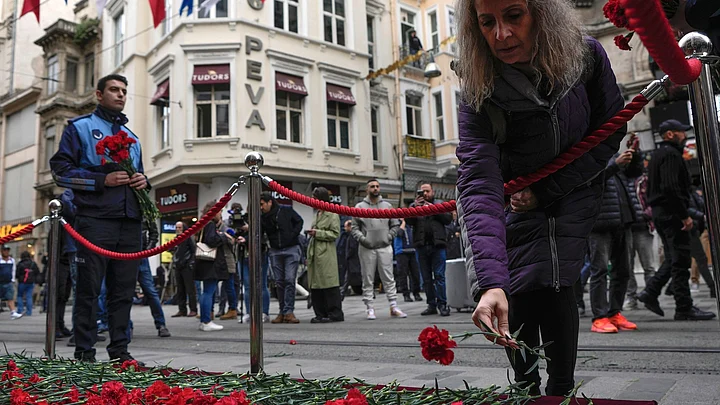Turkey’s interior minister accused Kurdish militants in northern Syria of a bombing in a busy shopping street in Istanbul on Sunday, 13 November, that killed six people and said that a suspect had been arrested, while 21 others were previously detained.
News agency AFP reported that according to the Turkish police, a Syrian woman planted the bomb.
TRT, a state broadcaster, released footage of the police escorting out a woman from an apartment following an overnight raid.
Who's the suspect? The woman had curly hair and was dressed in a purple jumped with 'New York' printed on it. She was brought into the police headquarters, according to TRT footage and officials used K9 units to search the apartment, recovering gold, money, and ammunition, it showed.
Meanwhile, Interior minister Suleyman Soylu blamed militants from the Kurdistan Workers’ party (PKK) and the People Defense Unites (YPG) for the attack.
“Our assessment is that the order for the deadly terror attack came from Ayn al-Arab in northern Syria, where the PKK/YPG has its Syrian headquarters,” he said.
Who are the PKK? The PKK, an offshoot of the Kurdistan Workers Party was internationally listed as a terror organisation by the Turkish Ministry of Foreign Affairs, the United States (US), and members of the European Union (EU).
The PKK has fronted an insurgency against Turkey since 1984, which has claimed the lives of over 40,000 people in clashes on both sides.
While Kurdish militants and attackers linked to the Islamic State have been blamed for attacks on central Istanbul in the past, the attack has not been officially claimed by any group so far.
‘Smell of Terror,’ Says Erdogan on Brink of G20
The blast took place at around 4:20 pm local time (6:30 pm IST) on Sunday, 13 November in Istanbul’s popularly Istiklal Avenue and was timed to strike when the area was the most crowded.
Shortly before departing for Tuesday’s G20 summit in Bali, Turkish President Recep Tayyip Erdogan said that the perpetrators would be punished and condemned the “vile attack.” Erdogan said that the “smell of terror” was in the air.
Justice minister Bekir Bozdaa said that “a woman sat on a bench there for 45 minutes,” and that the explosion took place just moments after the woman left.
“The international community must pay attention. Terror attacks against our civilians are direct and indirect consequences of some countries’ support for terror groups. They must immediately cease their direct and indirect support if they want Türkiye’s friendship,” he said.
The attack was condemned by the US, EU, Egypt, Ukraine, and Greece, who also expressed their condolences for victims.
The presidency's communications director said that such attacks are "direct and indirect results of the support some countries give to terrorist organisations."
Interior minister Soylu compared the US' condolences to "the murderer arriving as one of the first at the scene of the crime."
‘Almost Deafening’: Eyewitnesses Remember the Blast
Local television news reports showed images of what looked like a woman, leaving a package below an elevated flower bed in Istikal Avenue.
Videos from the moment of the attack showed people running scared and trying to find cover as a billowing fireball filled the air in the distance.
Cemal Denizci, an eyewitness, told AFP, “I was 50-55 metres away, suddenly there was the noise of an explosion. I saw three or four people on the ground.”
“There was black smoke. The noise was so strong, almost deafening," he told AFP.
Hayat, who was inside an Internet cafe on the street during the blast, said that turmoil followed the explosion.
"I saw people running around and wounded people were passing by the internet café towards hospital…It was a frenzy,” she said.
Another witness, 20-year-old Eyup told BBC that “there is fear” among residents of Istanbul after the attack, and added that many people may be seen maintaining their distance from crowded areas like Taksim.
Turkish media ombudsman, the Radio and Television Supreme Council (RTÜK) placed a temporary ban on reporting on the blast, and prevented broadcasters from showing the exact moment when the blast took place or its immediate aftermath “to avoid broadcasts that may create fear, panic and turmoil in society and may serve the purposes of terrorist organisations”.
Reminiscence of Previous Attacks
Turkey was hit by a deadly string of bombings by the Islamic State and outlawed Kurdish groups between 2015 and 2017, including a suicide bombing attack, on the same street as Sunday’s explosion, on 19 march 2016. The attack in 2016 killed five and injured 36.
Moreover, in January 2016, a suicide bomber killed 13 people in the bustling Sultanahmet district. In the same year, attackers with automatic weapons and explosive belts attacked the entry to Istanbul’s Atatürk airport and killed 45 people, injuring over 230.
A PKK offshoot also claimed responsibility for twin bombings outside an Istanbul football stadium in December 2016, killing 38 and wounding 155.
(With inputs from TRT, AFP, BBC, The Guardian)
(At The Quint, we question everything. Play an active role in shaping our journalism by becoming a member today.)
